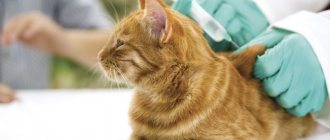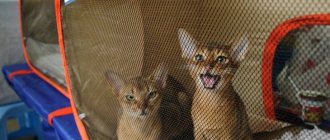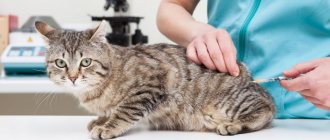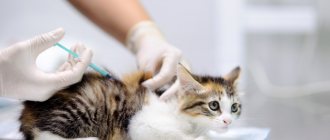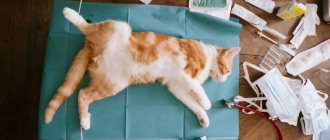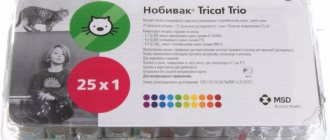Many people today, when they get a cat or kitten at home, think about vaccinations. In this article we will look at all the information in detail.
Sections of the article:
- Do kittens and cats need vaccinations? Advantages and disadvantages
- What vaccinations should indoor and outdoor cats have?
- Vaccination prices, vaccine cost
- When do kittens get their first vaccination? At what age?
- All about the rabies vaccination
- Preparing for vaccination
- Vaccination schedule for kittens and adult cats: what vaccinations are given and when?
- Where to get vaccinated
List of standard vaccinations and schedule
Every pet must be vaccinated against the following diseases:
- Panleukopenia (in common parlance – plague). This is the most dangerous disease, often leading to death. It affects cardiac and respiratory functions.
- Viral tracheitis. This disease affects the respiratory system. It is accompanied by rhinitis, conjunctivitis and discharge from the sinuses. This disease is fatal.
- Chlamydia. With the disease, respiratory and visual function are impaired. Sometimes there is a disorder of the digestive system. As a result, the pet becomes infertile or dies.
- Calicivirus infection. It is difficult to treat, since the pathogen can mutate. Signs of the disease are cramps and lameness, accompanied by a cold.
- Rabies. The disease is dangerous both for the animal itself and for its owner. Such infectious diseases are the most dangerous for a kitten, for this reason vaccinations should be done first.
Currently, there are two types of animal immunization:
- a set of vaccinations against 4 major ailments;
- separate injection for rabies.
Vaccination is carried out only if the cat is completely healthy; for this reason, it needs to be examined by a veterinarian. It is possible that the animal may have a personal intolerance to the injected drug, but the injection will still have to be given. This will help your pet suffer from the disease in a less tragic way.
Also read the article about vaccination of adult cats.
What are kittens vaccinated against?
The immunization schedule is as follows:
- The first vaccination is given to a kitten at 2 months;
- the second – at 3 months of age;
- the third – at the age of 1 year.
In the future, vaccination is carried out annually, and the injections must be renewed each time.
This scheme should be followed from birth until the moment the animal dies. This way the pet can live for a very long time. To easily track the time of vaccine administration, you can purchase a special diary at the veterinary hospital.
Recommendations for preparing for vaccination
Preparing a kitten for its first vaccination is a simple process. A prerequisite is treatment against helminths. It is advisable to give antihelminthic drugs in 2 doses, so that the last one is no later than 10 days before the planned date of vaccination.
Another important factor is the health of the vaccinated animal. Before vaccination, monitor your pet’s behavior for several days: he should be cheerful, cheerful, play actively and eat well. If in doubt, it is better to consult a veterinarian before the procedure. The doctor, having examined the animal and found signs of illness in it, will most likely postpone vaccination until complete recovery.
Primary vaccination and its distinctive features
From the age of 2 months, each kitten needs to be vaccinated regularly. At earlier stages, vaccinating an animal is pointless, since the body will not develop the required immunity. Primary immunization is necessary so that the pet’s body learns to resist many pathogens. This will help improve the health of the four-legged animal and also prolong its life.
Immunization is a strong stress for the baby's body. To avoid possible consequences, it is recommended to give the injection at home. In a familiar environment and next to the owner, the cat will tolerate this procedure more easily.
Before vaccinating a kitten for the first time, the possibility of contact with sick relatives should be excluded. If the baby interacts with an infected animal, immunization must be rescheduled.
This requirement also applies to pets who have undergone surgery. Primary vaccination for a four-legged friend is allowed only 25 days after surgery.
If a cat's baby teeth are replaced by permanent ones, the injection should be carried out after they are completely replaced.
Primary vaccination can provoke the development of adverse reactions in the form of lethargy, drowsiness, loss of appetite, loss of interest in games. This phenomenon is a normal reaction of the body to the administered drug.
If the baby refuses food for more than 24 hours, there is an increase in temperature and indifference, you urgently need to seek help from a veterinarian.
WHAT VACCINATIONS ARE CATS, KITTENS, AND KITTENS GIVEN? WHAT DO VACCINATIONS PROTECT FROM?
We list exactly what vaccinations (as well as mandatory preventive measures) are given to cats and adult cats and kittens:
- Deworming (deworming kittens)
- For infectious viral diseases (panleukopenia, rhinotracheitis, calicivirosis, chlamydia, viral leukemia, FIP)
- For rabies
- Prevention of fleas, ticks and other parasites
Let's take a closer look at each specific vaccination, its features, methods of infecting an animal and the immediate harm it can cause. Please read the information carefully and decide which vaccinations your kitten/cat needs.
| Cat diseases | Mandatory vaccinations | Defeat | Infection |
| Panleukopenia (distemper, feline infectious gastroenteritis, parvovirus enteritis) | + | A very contagious, acute infection that is difficult to tolerate. Possible fatalities. Sharply reduces the number of bloody white cells (leukocytes) (white blood cells) in the animal's blood. | - direct contact with an infected cat - through household/interior items - by airborne droplets - infection of kittens in utero through a sick mother cat - through sexual contact - blood-sucking insects - through clothes/shoes from the street - people who have been in contact with sick kittens and cats - in veterinary clinics where there may be infected animals |
| Rhinotracheitis (feline herpes) | + | A complex viral disease that affects the respiratory tract (organs responsible for breathing) and the eyes of cats. Lethal outcomes in 5-20% of cases. | |
| Calicivirus | + | Affects the respiratory system, eyes, mucous membranes. Causes lameness in cats. | |
| Chlamydia | Very desirable. When breeding and mating - a must! | The genitourinary system and gastrointestinal tract are affected. The disease also causes rhinitis and conjunctivitis. | - direct contact - airborne droplets - through sexual contact - through fleas/ticks - small rodents Recovered animals are also carriers of this disease. |
| Rabies | Very desirable. For show animals traveling abroad - a must! | The animal's nervous system is affected. Rabies infection is fatal in almost 100% of cases. | - bite of an infected cat - through saliva - eating small sick rodents |
| viral leukemia (leukemia, leukemia, lymphosarcoma, FeLV, FLV) | There are currently no vaccines | The natural immune system is suppressed. Malignant formations (tumors, oncology) appear, the tonsils, lymphatic system, circulatory system, and bone marrow are affected. High percentage of deaths. | — bite/damage from an infected cat — through saliva — sexual contact — intrauterine infection of kittens from a sick mother |
| FIP (Feline Infectious Peritonitis, ICP, FIP) | There are currently no vaccines | It affects the mucous membrane, small intestine (which causes severe diarrhea), and the abdominal cavity. Difficult to diagnose. Cats living together in large numbers are susceptible to infection. Possible fatalities. | - through feces (through the tray) - orally (through saliva, common dishes of cats) |
| Lichen (trichopytosis and microsporia, ringworm). | It is not difficult to treat, but if there is a possible risk of infection, it is better to vaccinate | Affects skin, fur, claws | - direct contact with affected cats - through spores (particles of infected skin areas) that can enter the house through clothes/shoes, household/interior items - people who have been in contact with sick kittens and cats |
| Feline immunodeficiency (FIV, AIDS) | If the cat is kept only at home, infection is unlikely. Cats freely roaming outside are a must! | The natural immune system is suppressed. Affected: lymphatic system, circulatory system. | — through bites — sexual contact — through blood, saliva — in utero from a sick mother cat — with the milk of a nursing cat |
| Aujeszky's disease (false rabies, infectious boulevard paralysis, pruritic plague, rabid scabies) | Cats freely roaming outside are highly desirable! | Lymphatic tissues, mucous membranes of the oral cavity and pharynx, nervous system, spinal cord and brain are affected. The disease is accompanied by severe itching. An animal can be cured in the initial stage of the disease. | - through the digestive system (eating infected rodents, unprocessed infected meat, pork) |
Complex vaccination Nobivac (Nobivac Tricat Trio):
Complex vaccination Purevax (Purevax RCPCh):
WHAT DO VACCINES PROTECT FROM. COMPLEX VACCINATION. RABIES VACCINATION.
Each specific vaccination is aimed at protecting a cat from a specific viral disease.
Comprehensive vaccination for cats
There are also complex vaccinations , which, accordingly, combine several vaccines at the same time. Most often, it is Panleukopenia + Rhinotracheitis + Calicivirosis, sometimes it also includes Chlamydia.
Rabies vaccination for cats, cats, kittens
Rabies vaccination is a separate issue. All animals are vaccinated against rabies, not just cats and dogs. It is highly advisable to do this to all animals.
Firstly, it protects your pet from infection.
Secondly, it protects you from unpleasant consequences that may arise due to physical contact (bite, scratch, saliva) of your pet with other animals, children, and adults. Such conflicts can end not only in administrative penalties and payment for preventive treatment of the applicant, but also in the euthanization of the animal.
How much does a cat's rabies vaccination cost?
Its cost is not at all high; it mainly depends on each specific vaccine. On average, the price ranges from $2 to $4.
Rabies vaccination for a kitten: when to do?
Kittens are also given this vaccination. It is allowed to be carried out no earlier than 3 months; vaccination is often carried out simultaneously with a repeated complex vaccination.
How often are cats vaccinated against rabies?
Rabies vaccination is repeated annually.
How long does it last?
Moreover, if the date of the previous vaccination is, for example, 01/01/2020, then the next one must be done no later than 12/31/2020. That is. the interval should not be more than a year.
Side effects
Side effects from rabies are minimal. If all the rules before vaccination were followed, such as a preliminary examination, prevention of worms, parasites, etc. (see below for more details), then the kitten will most likely simply be slightly lethargic and drowsy for some time after vaccination. They may refuse to eat for some time. More serious side effects are extremely rare. But if they suddenly appear, contact your veterinarian immediately.
VACCINES, INCCINATIONS AND THEIR PROTECTION
| Complex vaccination: Panleukopenia + Rhinotracheitis + Calicivirosis | Chlamydia | Rabies | Viral leukemia | FIP | Lichen |
| Felovax, USA | + | + | |||
| Multifel (Russia) | + | + | |||
| KhlamiKon, Russia | + | ||||
| Nobivac rabies, Netherlands | + | ||||
| Rabizin, France | + | ||||
| Felovax LV-K, USA | + | ||||
| Leucocel 2, USA | + | ||||
| Nobivac FORCAT, Netherlands | + | + | |||
| Purevax RCPCh, France | + | + | |||
| Quadricat, France | + | + | |||
| Leucoriphenin | + | ||||
| Nobivac Triquet, Netherlands | + | ||||
| Felocel CVR, USA | + | ||||
| Katavac Chlamydia | + | ||||
| Purevax FeLV, France | + | ||||
| Primucell FIP, USA | + | ||||
| Microderm, Polivac TM for cats, Vakderm – F | + |
Dead or live vaccines?
Vaccinations for cats and kittens can be done with two types of vaccines: dead and live. Let's take a closer look at them and compare them, identifying all the pros and cons.
| Comparison options | Alive | Dead |
| Description | These are weakened but living viruses | Dead viruses introduced into the cat's body |
| Speed of interaction | Immunity develops 6-7 days after the vaccine is administered | Immunity develops immediately after the vaccine is administered |
| Development of immunity | Develop stronger immunity | Immunity is developed only to the amount of injected antibodies that enters the cat’s body upon administration. Due to this, immunity is not as strong as in the case of live vaccines. |
| Post-vaccination period | The post-vaccination period may be more difficult; it is more difficult for animals to tolerate compared to cats vaccinated with dead vaccines. | Passes quite easily, without causing serious complications |
| Peculiarities | Storage and transportation conditions must be strictly observed | |
| Possibility of infecting a cat with this disease | can infect a cat with this virus (if the immune system is very weakened, as well as in the event of a mutation caused by a change in the genetic structure of the animal). But these are isolated cases | It is impossible to infect an animal |
Age for rabies vaccination
Immunization against rabies is carried out for the baby at the age when communication with other animals begins (at about 3 months).
In cases where the cat practically does not communicate with its relatives, the vaccine is administered at 6-8 months of age.
Re-vaccination is carried out annually at approximately the same period.
Usually, an anti-rabies injection has a strong effect; as a result, after vaccination, the baby becomes lethargic and weak, in addition, the temperature rises for a couple of hours.
How to vaccinate yourself
When can you walk your puppy after the second vaccination?
Before vaccination, you must carefully study the instructions. It will indicate how the vaccine will be administered. For example, subcutaneous injections are placed at the withers. The rabies vaccine is injected either into the withers or into the muscle. In both cases you need to prepare:
- cotton pads (or just cotton wool);
- several sterile syringes (2 cubes or less). Insulin syringes are suitable;
- vaccine (if necessary, solvent for it);
- antihistamines (in case of allergic reactions). Suprastin must be available.
Injection into the withers:
- Calm the animal and pick it up.
- Draw the drug into the syringe. If the vaccine has two fractions, then first you need to inject the solvent into the vaccine vial with a sterile syringe and shake it.
- Wipe the area where the injection will be given with alcohol. Do it carefully and calmly so that the cat does not become nervous.
- Place the animal on all four paws. Take it by the withers and pull it up a little. The tension forms a notch, and you need to inject it into it. With a quick, confident movement, insert the needle into the subcutaneous tissue to a depth of 1.5 cm. The syringe should be parallel to the cat’s body. The drug should be administered at an average speed (do not hesitate), without sudden movements.
- Carefully remove the needle and release the animal.
How to vaccinate yourself
Into muscle:
- Place the cat on its side. Feel the muscle on the thigh (lower part) (the animal’s paw should be extended).
- The vaccine must be administered in a vertical, perpendicular position. Do it quickly and confidently. The needle should be inserted halfway (maybe a little deeper) into the densest place. If you overdo it, you can damage the sciatic nerve.
- Remove the syringe, stretch the muscle and release the pet.
Key requirements for immunization
When immunizing a kitten, you should follow some rules:
- the drug can only be administered to a completely healthy pet;
- Injections are prohibited for a kitten after communicating with infected relatives;
- after immunization, surgical intervention is contraindicated for 21-25 days;
- after surgery, vaccination is not carried out for at least 21 days;
- if antibiotics are used for therapy, administration of the medication is allowed after 2 weeks;
- It is forbidden to vaccinate your pet when changing teeth;
- the vaccine should not be expired;
- It is contraindicated to vaccinate pets under 2 months of age;
- During the procedure, the baby must be calm.
Types of vaccines for cats
There are two types of vaccines: killed (inactivated) and live (attenuated, weakened).
Live vaccines contain weakened microorganisms that infect and cause mild illness in the animal, but at the same time intense (strong) immunity is developed. These vaccines include:
- Nobivac Tricat, Nobivac Forcat
- Phellocell CVR
- Purevax
Killed vaccines do not infect the animal, and the immune response to them is weaker. Killed vaccines:
- Multifel 4
- Nobivac Rabies
- Rabizin
Possible consequences after vaccination
After immunization, some unpleasant consequences are possible:
- lethargy;
- lack of appetite;
- elevated temperature;
- pain at the injection site;
- encephalitis;
- polyneuritis;
- arthritis;
- convulsive conditions;
- changes in behavior;
- loss or change in hair color in the area where the medication was administered.
Increased sensitivity to the vaccine and immune reaction may manifest itself as:
- inability to develop immunity after injection;
- tumors at the injection site;
- reactions caused by incorrect or untimely vaccination.
Possible complications after vaccination
In most cases of cat immunization, no serious side effects are reported after vaccination. Usually the entire period of antibody production proceeds without problems. But doctors emphasize that everything is individual.
After routine vaccination, cats may experience:
- lethargy;
- loss of appetite;
- anxiety;
- infrequent sneezing;
- swelling at the injection site;
- anxiety;
- drowsiness;
- fever;
- slight increase in temperature;
- allergic reactions;
- inflammation of the subcutaneous cellular structure (removed only surgically).
Note! Since January 2021, all veterinarians have been following a single protocol - before the procedure, they notify cat owners about changes to the vaccination regulations. Now the vaccine is placed not in the withers, but in the muscle of the hind leg. This precaution allows us to exclude the development of malignant neoplasms in the lungs (sarcoma), which over the past 2–3 years have often been recorded precisely after vaccination at the withers.
How does the pet behave after manipulation?
Traveling to a veterinary hospital, unfamiliar aromas and people, and, in addition, unpleasant manipulation, are stressful for the animal, especially when it has not been taken out of its home before.
After returning from the hospital, the kitten may refuse food and play, hide in a secluded place and sleep for some time. After getting up, you need to offer your pet a small amount of his favorite treat.
The next time he refuses, you shouldn’t force him. Probably, the first day after vaccination the baby will only drink. You need to make sure that there is enough fresh water in the bowl.
During the first two days, you should not ventilate the room where the kitten is - due to a weakened immune system, it can easily catch a cold.
Possible side effects
In most cases, vaccination is well tolerated by kittens. Sometimes animals experience drowsiness, lethargy and decreased appetite within 2-3 days after vaccination.
Very rarely, an allergic reaction occurs due to individual intolerance to the components of the vaccine, which is manifested by the following symptoms:
- itching,
- diarrhea,
- vomit,
- difficulty breathing,
- swelling of the muzzle and paws.
In this case, you should immediately consult a doctor.
Mr. Cat advises: the most famous drugs for vaccination
The following products are used to immunize kittens:
| Name of the drug and for what ailments | At what age is it introduced, in weeks? | Re-introduction |
| Nobivac Tricat. Complex barrier against rhinotracheitis, calicivirus infection, plague. | 9-12 | After 21 days |
| Nobivac Rabies. Against rabies. | 12 | Not required |
| Quadricat. A comprehensive barrier against disease and rabies. | 12 | After 12 months, however, the rabies component is excluded |
| Eurifel RCPFeL.V. Cumulative protection and feline viral leukemia. | 7 | In 5 weeks |
A comprehensive barrier against three diseases and chlamydia:
| 7-8 | After 28 days |
| 8 | ||
| 8-12 | ||
| 10 |
| |
| Primucell FTP. A drug against infectious peritonitis. | 16 | After 28 days |
| Vakderm F. Protection against microsporia trichophytosis. | 6 | After 14 days |
| Microderm. A drug for lichen. | 6-8 | After 21 days |
| Polivak TM (for cats). Protection against dermatoses. | 10-12 | After 5 weeks |
The most famous brands of vaccinations
| VACCINE | INFECTIONS |
| Nobivac Tricat | viral rhinotracheitis, calicivirus, panleukopenia |
| NobivacRabies | rabies |
| Multifel | viral rhinotracheitis, calicivirus, panleukopenia, chlamydia |
| Vakderm | microsporia, trichophytosis |
| Eurifel | feline viral leukemia, viral rhinotracheitis, calicivirus, panleukopenia |
| Felovax | viral rhinotracheitis, calicivirus, panleukopenia, chlamydia |
| Microderm | microsporia, trichophytosis |
| Felocell | panleukopenia, calicivirosis, viral rhinotracheitis, chlamydia |
| Feligen | panleukopenia, calicivirus infection, viral rhinotracheitis and rabies |
| Chlamikon | chlamydia |
| Rabizin | rabies |
| Quadricate | rabies, panleukopenia, calicivirosis, rhinotracheitis |
| Purevax | panleukopenia, calicivirosis, rhinotracheitis, chlamydia |
Immunizing your pet before traveling
When planning a trip with your pet, you need to get a certificate from the veterinarian with information about the vaccination performed. Such documentation will be needed to purchase a ticket for any public transport traveling long distances.
The immunization document must be issued in accordance with the law and include information about the vaccinations given to the cat. If the trip is made to another region of the state, obtaining a certificate from a veterinarian is an indispensable condition.
Vaccination of Scottish and British kittens
The Scots and the British are artificially bred breeds of cats, as a result of which they have almost no immunity of their own. Therefore, it is necessary to introduce all the required vaccines in childhood, since the possibility of infection is very high.
Although pets of such breeds are ornamental animals that rarely leave their homes, immunization must be taken seriously. These kittens do not need any special vaccinations. The drugs are suitable for any four-legged friend.
What is colostral immunity and when should you start vaccinating your kitten?
Colostral immunity is antibodies transferred to a kitten with the colostrum of a vaccinated mother cat on the first day after birth. This immunity lasts for an average of 8-12 weeks. These figures are arbitrary, as they depend on many factors: how long ago and with what vaccine the cat was vaccinated, whether the kitten received a sufficient amount of colostrum on the first day, the individual characteristics of the kitten and mother.
- Kittens are vaccinated from 8 weeks or from 12 weeks (if the mother cat was vaccinated before pregnancy). Then revaccination (re-vaccination) is carried out after 3-4 weeks, depending on the type of vaccine. The first vaccine is administered to the kitten to neutralize maternal antibodies, and the second creates immunity that will protect the kitten for many months.
- It is important to use the first two vaccines from the same manufacturer. Cats over 12 months of age are vaccinated annually.
- Only clinically healthy animals are vaccinated.
- During pregnancy, vaccination is dangerous for the fetus.
- Vaccination is carried out based on the protocol of the International Association of Small Animals WSAVA, but taking into account the individual characteristics of each animal.


